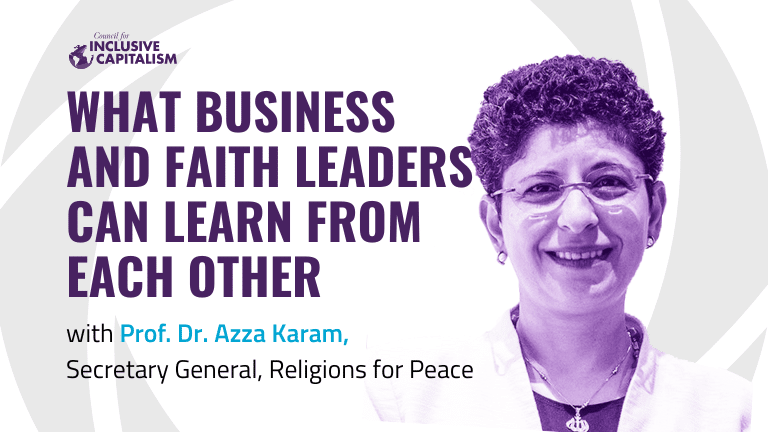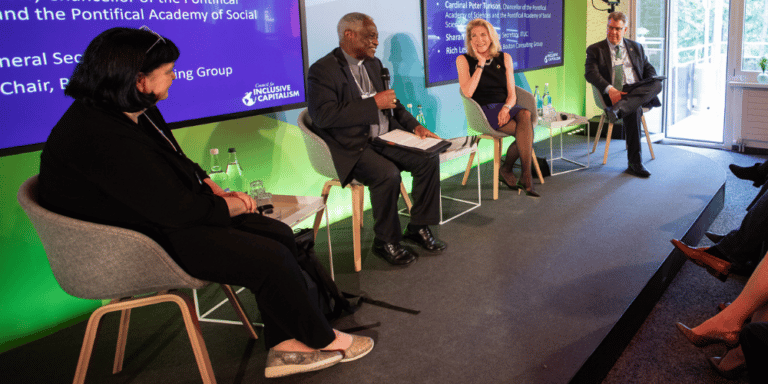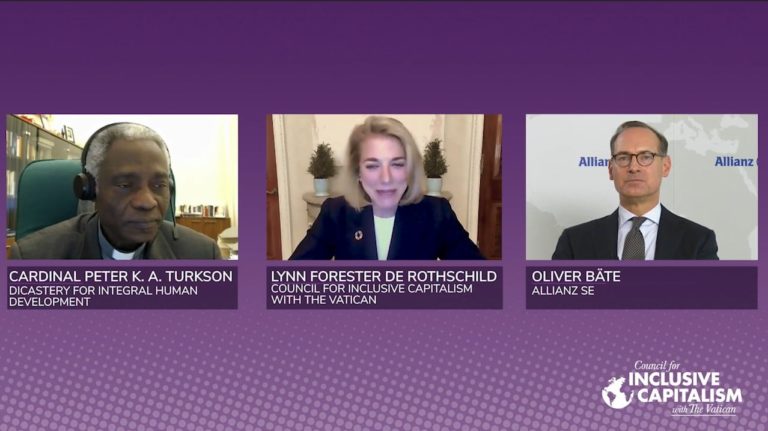What Business and Faith Leaders Can Learn from Each Other with Professor Azza Karam
Featured Members

Council for Inclusive Capitalism CEO Meredith Sumpter sat down with Religions for Peace Secretary General, Professor Azza Karam to discuss what business and faith leaders can learn from each other.
View Transcript
Meredith: Hello everyone, I’m Meredith Sumpter. I’m the CEO for the Council for Inclusive Capitalism, and I am so delighted to be joined today by Professor Azza Karam, who is Secretary General of Religions for Peace. The Council for Inclusive Capitalism and Religions for Peace are embarking on a partnership to provide our members access to moral guidance from faith based and ethical leaders from around the world. And Azza, I’m delighted to have you here with me today. Welcome.
Azza: Thank you so much for having me here today, and I’m delighted to be able to have this conversation with you, Meredith.
Meredith: For more than 50 years, Religions for Peace has brought together diverse leaders from all the faith and ethical traditions to collaborate in service of global peace and prosperity. So, I’m hoping you can share with us a bit about the mission of Religions for Peace and how it came to be.
Azza: So, it’s a lot like the United Nations system, where the United Nations is 193 governments. About 50 years ago, religious leaders representing different religious institutions felt, and this is now the height of 1970s, the height of the nuclear war, felt that it was important to bring in the moral authority and power of religious institutions and faith communities to be together with the authority and power leveraged by governments or state institutions. So, they felt that they needed to have all these different religions standing in solidarity with one another and with the global international community, and they found its Religions for Peace really with almost exactly the same mission as the United Nations, that is, to bring the world’s people together to secure peace. Peace, not just the absence of conflict, but peace in the sense of human dignity, restored and equal between all.
Meredith: Azza, I’d like to hear your take on the voices of faith and ethical leaders in guiding their communities. But also, in guiding those who are searching for greater meaning in their role and their agency in economy and in society. We as a council, as you know, are a non-sectarian community of CEO leaders who recognize that there’s both a moral and a market imperative to practicing capitalism differently. But I’m hoping you can share with us your perspective on why the voices of faith and ethical leaders are so important in finding guidance on common global challenges like income inequality and inequities. what unique perspectives can religious and ethical leaders provide us and offer to private sector leaders and public sector leaders in this way.
Azza: So, it’s a beautiful question, and to answer it diligently, you and I would have to talk for hours. Let me try to summarize. There are some key strengths that religious leaders and faith leaders bring. Many of them are also CEOs of their respective enterprises. They can be religious institutions. They can be religious non-governmental organizations. They can do both and more. Faith communities are incredibly heterogeneous and diverse. Something like the World Evangelical Organization has the evangelical churches, but it also has so many evangelical NGOs that are running in different sectors, doing different things around the world. So, it’s a massive enterprise. The Vatican is not just a church in Italy. It’s actually a state. It’s actually a state. It’s considered a state level by the United Nations system. And they administer as a government would. They have ministries of different enterprises, health, education, sanitation, nutrition, and then they have their social development arms, different kinds of NGOs. So, the realms of religion are really and truly massive and extraordinarily diverse. So, the person who sits at the head of these institutions is often not only a very powerful voice of theology and morality and ethics because that’s their business, that’s their main bread and butter, but they are also teachers or professors or scientists or CEO leaders of organizations.
So, the kind of, if you will, mix skill set applies to almost every sphere of life that these religious leaders think. There is very rarely a religious leader who will serve to represent their institution formally, which is what we’re talking about in Religions for Peace. We’re not talking about just every faith leader, like, well learned faith leader. We’re talking about the ones who are officially designated to represent their institutions and their communities. Very rarely would one of those only be doing the job as just an imam, right? Just the imam of this particular mosque. That’s it. Rarely ever is that the case. In fact, the leadership that we have with us in Religions for Peace are people who, per definition, wear a million hats. There’s a woman who’s heading the Lutheran Church of Sweden, which means that she’s serving in the World Council of Churches to represent her institution networks. That means she’s working with other churches that have 500 million followers around the world. She’s also heading the social service networks within the Lutheran Federation, which is a gazillion I don’t know how many millions. They’re managing budgets and monies. They are reaching out to people on systematic weekly intervals to preach and teach to millions.
And on a day-to-day basis, they get visited and visit many of their own believers and communities. So, it’s unparalleled outreach. Now, if that doesn’t seem to convince enough people, let me mention two more small items for consideration of why this particular community is so incredibly powerful. In most instances, they also own land and resources, institutions and buildings. They own them. So, this one chap, or lady who heads her community is also responsible for managing the resources that they own. And remember, remember, that religious institutions are the original landowners, right? They’re the original landowners. Long before we had landowners, we had religious institutions who owned land and have people working on them and working for them. So, they’re landowners. So that means if we’re thinking about concerns about what happens with real estate or if we’re thinking about concerns about how to preserve our environment and the way we’re producing, this is the community we have to speak to and work with effectively. And if that’s not convincing, then let’s look at the following fact that in 99.9% of all cases of religious leaders around the world, they’re actually involved in some way, shape, or form in politics, if not themselves, as leaders, as political leaders, then as very heavy influences of political processes in this country, the United States of America, the civil rights movement was possible and made possible and successful in its heyday in the 60s thanks to the presence and the active collaboration of religious leaders. Martin Luther King, Jr., anyone? Rabbi Herschel, anyone? They came together to form a very powerful civil rights movement, which we’re still trying to put together and make it serve just as powerfully today. So, on every level, we have something here in the United States called, what is it called? Prayer Breakfast. Prayer Breakfast, which is where everyone who’s anyone comes together, pays to come to this table of influence. So politically, socially, economically, these are people of remarkable influence and affluence.
Meredith: I think that’s so very powerful and the parallels of business or private sector leaders along with faith based and ethical leaders looking for ways that they can be accountable to and serve the needs of their many stakeholders, including their shareholders, whomever they might be.
But this is a very apt way to think about what business leaders and faith-based leaders learn from one another. The Council for Inclusive Capitalism as a non-sectarian organization, we came together being inspired by the challenge that one faith leader, Pope Francis, who challenged leaders of industry and economy. And his message to us was this: if capitalism is going to change, if we are going to have economies that place human dignity and the needs of people sustainably at the core of what we do, that it really is up to the leaders of the private sector.
We must not wait for the perfect rules or regulations to come from the public sector. But rather, we must act, often in concert with the public sector as we are taking our companies from just profit-creating centers to creating more broad-based value that is profitable but in ways that meet the needs of people and our planet.
And I think that message really resonates with everyone, regardless of whether you subscribe to a faith or ethical tradition at all. Our members, at the Council, come from all different backgrounds. But I think what’s important here is that Council members all recognize our moral obligation to one another as human beings, which reflects the message of human dignity that you spoke so eloquently to, Azza. So, thank you very much for that.
But you know, we are in a time when CEOs are facing increased challenges including inflation, rising rates and supply change disruptions, and other issues due to geopolitics, war, and the ongoing pandemic. And Azza, I wonder if you could share with us what advice might faith leaders have for business leaders on usefulness of ethical values such as fairness, and trust, and responsibility, and sustainability when they’re facing all these competing bottom line pressures.
Azza: If I had the answer to that, I probably would be a CEO of one of the companies myself. But I’m going to try my best to just mention a few, if you will, facts. One of the things that we’re also confronting in these very dire times is what a valueless economy would look like. And we can see that happening around us, what a valueless politics looks like. Invariably, valueless economies and valueless politics affirm not the rule of law, not the rule of common decency, but they affirm injustices and discrimination and ultimately loss of value. And that means a loss of profit. So not to engage with our values when the going gets tough is to disengage from our values. Which means we basically run amok, where there’s nothing. It then becomes not the rule of law, but it becomes the rule of the jungle. Might makes right. And I think there’s enough studies in economics and in political economy that points to the fact that actually being value based is to achieve more profit. It’s more profitable to be value-based and to be seen as value-based. Because just as our world is confronting all of these tensions, that also means that there’s a lot more people looking to distinguish between where they will invest the little money that they have or the big money that they have.
To be value-based is a token of credibility and legitimacy and ultimately a winning ticket to making more money, attracting more investors and being able to be seen as greening the environment rather than destroying it, contributing to those who are vulnerable and disabled rather than walking on their necks and backs and just dismissing them. Being value-based is a ticket to being more profitable, actually. And this argument, by the way, was made years ago when there was a conversation about should we include women in the public space? How many women should we have women as CEOs? Is it really a good idea? And economy, economics proved that actually engaging women in the public sector, in the private sector was a profitable enterprise because women’s contributions as laborers in the public space is money that is being made. So actually, very sorry, but keeping them out is not a very smart idea to being able to have wise investment and being able to get more human resources. So, it’s the same thing with value-based approaches. You work and you’re seen and you’re understood to be a value-based company. That is an affidavit that nobody else can grant you. Nothing else can grant you that.
And it is priceless in the genuine meaning of those, not just prices. You cannot buy that kind of credibility, quite frankly. You may buy it for a short period of time, but you will ultimately use it. Being value-based is a means of securing and ensuring profit because it is your image, it is your credo, it’s your street cred and it’s what distinguishes you from a gazillion and one other businesses doing exactly the same thing. Right? But there’s another important distinction narrative. We are not just talking about being Hindu, being a good Hindu or being a good Muslim or being a good Christian. The whole point here is that our world is so intimately, intricately interconnected that one religion on its own, no matter how pure its adherence, no matter how remarkable its service will not be enough.
Meredith: I wanted to close on the importance of ethical values. The Council exists as a community of support for leaders to come together and recognize that true value creation for shareholders and stakeholders alike comes from a company realizing the purpose of their business and the role it plays in serving the needs of people and planet.
All of the great faiths and ethical traditions have values that are resonant with one another and that are certainly resonant across the guiding principles of Council for Inclusive Capitalism. Equitable outcomes. Equitable opportunity. Fairness across generations. And fairness to those in society who are unable to fully participate in the economy. These four guiding principles serve to guide council members’ actions, and they also give strength to council members who are finding themselves facing competing pressures.
Azza, what I’m hearing you say is that truly those companies that find their inner strength by focusing on the broad-based value creation they are capable of, when they put values and the needs of people and at the core of what they do, that they will see through these challenging times and show the way to a more fulsome and dynamic value creation, the kind of value creation that capitalism was intended for and is capable of, if we are intentional with our actions.
It’s with partnerships with organizations like Religions for Peace that the Council aims to provide members access to moral guidance so they have an important grounding foundation from which to respond to the social, economic and environmental challenges of our time in the way they practice capitalism.
So, thank you so much for sharing your thoughts with us today, Azza.
And at this moment in time when our faith-based leaders are engaged in discussion with global leaders, on wars, on economies, on how do we increase human dignity at a time of great social disruption, when you think about where we are and when you think about where we could go moving forward, what gives you hope?
Azza: What gives me hope is the longer-term perspective that religious leaders and institutions have as a matter of principle. Religions don’t look to the term of political office; they have predated and will continue to exist before all the regimes of government that we see today. By the way, same for companies. Religions have a long-term perspective. And very often, especially as we confront these very dire challenges: political, economic, financial, social, you name it. Being able to know that there is a longer term to look forward in order to build a resilience now. To work as if you’re going to be here in 100 years, which usually religious organizations are. To work towards as if you’re going to be here in 100 years in order to build your capability to enhance your capacity to increase your profitability now and thereby build the resilience that you need to be here for the next 100 years. That vision, that ability to be based in the here, now, and hereafter and work for it all is something that helps build my sense of resilience. But what gives me a very strong thrill in hope and with hope is the ability to see religions and religious leaders coming together.
And the tougher the circumstances, the more that ability of them to come together, to stand shoulder to shoulder, to confront like that fantastic image of Martin Luther King and Abby Hershel and a whole bunch of others leading the civil rights march. That gives me a sense of faith. It affirms my faith, my faith in people, my faith in the today, and my faith that there will be a tomorrow. It’s when they come together. Can you just imagine what it would be like to see a whole group of CEOs and a whole group of religious leaders standing shoulder to shoulder because together they’re going to sustain and build the resilience of our world and our planet. There is nothing more powerful than that image to me.
Meredith: So beautifully put. Dr. Azza Karam of Religions for Peace, thank you so much for being here with us today. Thank you for your partnership and that of Religions for Peace with the Council for Inclusive Capitalism.


